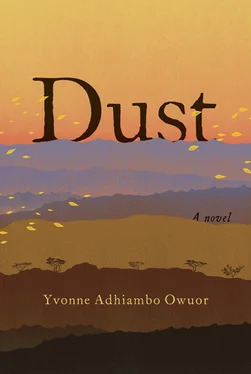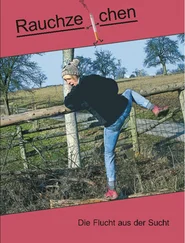After that, she strapped her crying children, one to her back, and the other to her front. Unthinking, she hunted for liquid, pursuing mirages, trusting that at least one would yield water.
Water.
She scrambled into dried-up water holes. Her breast milk dried up. The sun seared Ewoi’s and Etir’s skin red. They were dry-mouthed, thirsty.
“One morning they stopped crying.”
Akai’s voice is cracking.
Ajany’s eyes are extra wide.
Akai bit into her wrist to feed her children her blood, but her teeth slipped off her skin, her strength fading. Ewoi fell out of her arms, convulsing on the ground. Akai saw, with all her life, how truly small the baby was, how light her arms felt without the extra child. Ewoi tried to cry. Akai adjusted Etir and walked away, leaving Ewoi behind. In the near distance, a hyena howled. Akai walked on. Never looked back; the first stone veil dropped over her face. She walked the paths of hills that were dry, handsome, and still unyielding.
She stopped in the night beneath a hillock made of rocks with giraffe etchings carved into their surfaces, with their heads piercing clouds. Etir was looking into her eyes. She picked up a sharp-ended rock and started scraping her wrist. Then she managed to tear the skin at the back of her hands with her teeth. She placed the vein near the child’s mouth. Etir tried to drink, but his mouth stopped moving. His eyes remained half closed; his body still. Akai placed the child at the base of that hill and walked on. She walked through the night, into the Chalbi Desert, where she collapsed and waited to die.
It was not death that came, but water. Rain had fallen in the northern hills. The desert used to be a lake. A flash flood raced through a laga and dragged Akai downstream for two kilometers. She crashed into a rock. She let go. The waters swept her to the edge. They paraded carcasses of the newly dead. After an hour and a half of this, the floods receded. Akai waded out of the laga , its sand and mud squelching beneath her feet, located Mount Kulal and the Hurri Hills, and walked southeastward. Akai showed up at Wuoth Ogik to die.
A barbet twitters. The Wuoth Ogik courtyard gate lies open and swings in intermittent phases.
Akai points. “That’s where I walked through.”
She had sat on the ground to wait behind the shadows of the vessels into which water poured from the roof when it rained.
The green Land Rover drove up with an antelope tied to its chassis, streaks of blood washing down the window. Hugh Bolton in drab tan khaki jumped out first and headed toward the house. Nyipir, who had been driving, reversed the car and parked it next to the boma .
Akai waited for Hugh to unlock the house door before she stepped into view.
Nyipir had pulled out a rifle, which he leaned against the car. He put a foot on the step, using a knife to cut down the creature. Just then he heard Hugh shout, “Whore! Whore! Whore! Ngikakumok! Rain preventer!”
Nyipir cocked the rifle, thinking Wuoth Ogik was under attack by rustlers. Then he saw Akai Lokorijom, swaying, shuffling, and emaciated. Heard Akai say, “My father wants his bride price.”
“Whore-whore-whore.”
“They were two,” she said to Hugh. “Their names Ewoi and Etir.”
“Liar! Liar!”
“I leave them on the ground for you to bring.”
“ Ngikakumok!”
Akai said, “We can keep the bones.”
Hugh had rushed at her with his small army knife. She fell on the ground, not defending herself. “Two babies,” Akai repeated.
“Prostitute, monkey, slut, slug. Ngikakumok!”
Hugh’s penknife slashed at her arms, shoulder, stomach, aiming for her womb. Akai stuck to him. He had raised his knife over her neck when Nyipir clicked the rifle’s hammer into place and shot Hugh in the head. He reloaded the rifle, stepped back, and shot Hugh in the throat.
Akai says, “Such a man does not die easy.”
Akai looks toward Nyipir.
She glances at Hugh’s cairn.
Suffocating memories. Akai will not speak of how Hugh’s blood spattered them.
Nyipir had pointed the rifle at her, but she had thrown herself into his arms, kissed his face all over, and pleaded in a whisper, “Help me.”
The flood-of-blood night, sweating through fear. They carried Hugh’s body into the car with the antelope still on its roof. They drove as far as they could before the car got stuck, moved the body between them until they reached a red hill with fissures and overhangs, where they pushed Hugh through a twisted tunnel that became a cave, took him deep into the earth, found a chamber where they could sit and breathe. It was dark. It was cool. There, Akai straddled Nyipir, tore off his clothes, covered in Hugh’s blood. “Help me.” Forgetting who she was, what they had become and done. Akai and Nyipir did not leave the cave until mid-morning of the next day, while what was left of Hugh bled to death next to them.
Ajany’s teeth chatter, but she is not cold. Pinpricks of darkness. She senses that even Odidi is listening.
Revulsion. Fear. Terror.
Sight.
Night insects creak.
The house is still falling down.
Akai says, “Nyipir and me, we went back to the house and waited to be found. No one came.”
“But then so many seasons after, when memory is dust, Ali came. But he could see nothing.”
Akai then closes her eyes.
Inside Ajany, resonance from a song that was being sung as she first crossed the threshold into Saudade: “Clube Dorival.” “A morte é uma canção velha, profunda” (Death is a deep, old song), “braços eternos, curvados sobre as penas” (eternal hands cupping sorrows).
And inherited guilt.
Nyipir and Akai had planted new myths about Wuoth Ogik. It was an aborted mission base. Its disappointed priest had gone back to Europe, after giving over its stewardship to his assistant and friend, Nyipir. In Kenya’s pre- and early post-independence days, anything was believable. And a story repeated often enough became fact.
Ali Dida Hada paces the peripheries. Isaiah and Galgalu stand a little farther away, Galgalu translating and embellishing what he thinks Isaiah should know. Which is not much. “Mister Bolton he hears his two children with Akai-ma is died, much sorrow. So he falls on his gun and it misfires. Oh no! Much blood. Much sorrow. Mzee and Mama, they are afraid because he is died and this is a mzungu and his gun has died him. What people will say? Much sorrow. What to do? So they take his body inside a cave, far from eating animals and … and pray so he is never be forgotten, truly much sorrow.”
Stillness.
Akai then crawls, aiming for Odidi’s cairn. She rests her head on one of the stones. God will see that you reach your place, sleep in this cool place. Giver of peace, give me peace . Her voice is soft. Give my children peace .
SOMEWHERE NEAR THE COURTYARD, IN THE MIDDLE OF THE evening, Petrus accosts Ali Dida Hada. “I appreciate your love.”
Ali Dida Hada chokes.
Petrus asks, “All your money?”
“You wanted it.”
“Not everything.”
“Take it.”
“And you?”
Ali Dida Hada sneers, “Concerned?”
Ali Dida Hada turns away toward the boma .
Petrus, in an awkward gesture, tries to give Ali Dida Hada the sign-over papers. Rethinks, and rips them apart instead.
“A joint account?” Ali Dida Hada wonders.
“Better: I’ll be your relative. I’ll show up in every inconvenient season with a long story, one thin dead chicken — stolen — and hands outstretched to receive alms from you.” A sudden grin transfigures Ali Dida Hada’s face. Petrus asks, “Is that reasonable?”
Читать дальше











